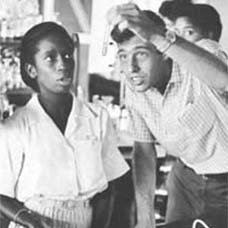January 4, 2005: Headlines: COS - Thailand: NGO's: Service: Tsunami: Newsday: Thomas Tighe, president of Direct Relief International, said the group is using precise lists of needed medicines and supplies provided by people in the disaster regions, even though it is a slow process. "Just sending drugs is easy. The point is to get the right stuff to the right people at the right time," he said.
Peace Corps Online:
Directory:
Thailand:
Special Report: Direct Relief International Head Thomas Tighe:
January 4, 2005: Headlines: COS - Thailand: NGO's: Service: Tsunami: Newsday: Thomas Tighe, president of Direct Relief International, said the group is using precise lists of needed medicines and supplies provided by people in the disaster regions, even though it is a slow process. "Just sending drugs is easy. The point is to get the right stuff to the right people at the right time," he said.
Thomas Tighe, president of Direct Relief International, said the group is using precise lists of needed medicines and supplies provided by people in the disaster regions, even though it is a slow process. "Just sending drugs is easy. The point is to get the right stuff to the right people at the right time," he said.

Thomas Tighe, president of Direct Relief International, said the group is using precise lists of needed medicines and supplies provided by people in the disaster regions, even though it is a slow process. "Just sending drugs is easy. The point is to get the right stuff to the right people at the right time," he said.
Providing drugs for tsunami victims has become a cooperative, well-researched effort to send the right stuff
BY PRADNYA JOSHI and ELIZBETH SANGER
STAFF WRITER
January 4, 2005
[Excerpt]
Now is not the time for bad medicine.
In the wake of previous disasters in which aid agencies received or shipped expired or useless drugs, charities and drug giants say they are working together to make sure that only appropriate medicines get to the tsunami victims.
The concern stems from several past incidents, including a World Health Organization audit in 1999 during the Kosovo refugee crisis. That report found that 50 percent of the drugs going in were "inappropriate or useless" and would cost $34 million to destroy. News reports from the time said shipments of lip balms and anti-smoking inhalers rather than syringes and antibiotics were sent to refugees fleeing to Albania.
In addition, 65 percent of the drugs were either less than one year from expiration or were missing expiration dates. Other studies, including one from Harvard University, found problems with drugs donated to developing countries. Drug companies get "enhanced deductions" for donating medicines to charities, which critics say prompts some firms to "dump" useless drugs.
In response to such problems, many aid agencies and drug companies formed an alliance called the Partnership for Quality Medical Donations to make sure that companies follow the World Health Organization guidelines for donations.
"The great bulk that is going is entirely fresh; it's not excess inventory," said Jim Russo, executive director of the partnership. The group's members include Johnson & Johnson, Bristol-Myers Squibb and Merck & Co.
Thomas Tighe, president of Direct Relief International, said the group is using precise lists of needed medicines and supplies provided by people in the disaster regions, even though it is a slow process.
"Just sending drugs is easy. The point is to get the right stuff to the right people at the right time," he said.
The most pressing need in the areas hit by the disaster is for core antibiotics, such as floxin and augmentin, and drugs for other kinds of infections, such as giardia, which comes from drinking unclean water, said Cathleen Grabowski, a pharmacist with Direct Relief. The organization accepts donations from drug companies and buys medicines, such as oral rehydration salts, when they are not readily available in the United States, she said.
When this story was posted in January 2005, this was on the front page of PCOL:
 | Peace Corps issues appeal to Thailand RPCVs
Peace Corps is currently assessing the situation in Thailand, anticipates a need for volunteers and is making an appeal to all Thailand RPCV's to consider serving again through the Crisis Corps. Also read this message and this message from RPCVs in Thailand. All PCVs serving in Thailand are safe. Latest: Sri Lanka RPCVs, click here for info. |
 | The World's Broken Promise to our Children
Former Director Carol Bellamy, now head of Unicef, says that the appalling conditions endured today by half the world's children speak to a broken promise. Too many governments are doing worse than neglecting children -- they are making deliberate, informed choices that hurt children. Read her op-ed and Unicef's report on the State of the World's Children 2005. |
 | Our debt to Bill Moyers
Former Peace Corps Deputy Director Bill Moyers leaves PBS next week to begin writing his memoir of Lyndon Baines Johnson. Read what Moyers says about journalism under fire, the value of a free press, and the yearning for democracy. "We have got to nurture the spirit of independent journalism in this country," he warns, "or we'll not save capitalism from its own excesses, and we'll not save democracy from its own inertia." |
 | Is Gaddi Leaving?
Rumors are swirling that Peace Corps Director Vasquez may be leaving the administration. We think Director Vasquez has been doing a good job and if he decides to stay to the end of the administration, he could possibly have the same sort of impact as a Loret Ruppe Miller. If Vasquez has decided to leave, then Bob Taft, Peter McPherson, Chris Shays, or Jody Olsen would be good candidates to run the agency. Latest: For the record, Peace Corps has no comment on the rumors. |
 | The Birth of the Peace Corps
UMBC's Shriver Center and the Maryland Returned Volunteers hosted Scott Stossel, biographer of Sargent Shriver, who spoke on the Birth of the Peace Corps. This is the second annual Peace Corps History series - last year's speaker was Peace Corps Director Jack Vaughn. |
 | Charges possible in 1976 PCV slaying
Congressman Norm Dicks has asked the U.S. attorney in Seattle to consider pursuing charges against Dennis Priven, the man accused of killing Peace Corps Volunteer Deborah Gardner on the South Pacific island of Tonga 28 years ago. Background on this story here and here. |
Read the stories and leave your comments.

Some postings on Peace Corps Online are provided to the individual members of this group without permission of the copyright owner for the non-profit purposes of criticism, comment, education, scholarship, and research under the "Fair Use" provisions of U.S. Government copyright laws and they may not be distributed further without permission of the copyright owner. Peace Corps Online does not vouch for the accuracy of the content of the postings, which is the sole responsibility of the copyright holder.
Story Source: Newsday
This story has been posted in the following forums: : Headlines; COS - Thailand; NGO's; Service; Tsunami
PCOL15828
18
.











